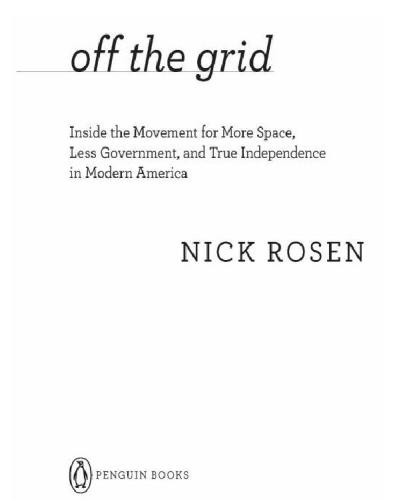
Off the Grid
Inside the Movement for More Space, Less Government, and True Independence in Modern America
کتاب های مرتبط
- اطلاعات
- نقد و بررسی
- دیدگاه کاربران
نقد و بررسی

May 10, 2010
Fed up with "the hyper-consumption of the past thirty years, the pointless acquisitions, the hopeless materialism, and the obsession with celebrity trivia," British journalist and filmmaker Rosen sets out across the U.S. to find the perfect off-the-grid community "beyond the reach of the power cables and water lines that intersect the modern world." His journey brings him into contact with a colorful collection of rebels and outcasts—aging hippies, anarchist kids, a middle-aged couple with an "off-the-grid McMansion" in Colorado—and he sprinkles his tale with the sorts of practical tips likely to appeal to anyone considering a similar adventure: the Clivus Multrum is "the Hummer of composting toilets." What Rosen lacks is a knack for storytelling; he would have done well to step back and let his subjects speak for themselves. Instead, he constantly inserts himself into the frame and insists on passing humorless judgment on nearly everyone he meets (and a fair number of people he doesn’t), and even whole cities are roundly dismissed (Boulder is "the smuggest town in America"). His curmudgeonly asides are off-putting, and it’s disappointing to see the book’s idealism and noble reach devolve into grousing.

May 15, 2010
A British journalist's account of Americans who have fled the mainstream to pursue marginal lifestyles.
Rosen initially defines off-gridders as people who are not connected to public utilities, estimating that there are now some 500,000 off-the-grid houses in the United States. He then expands his definition to include anyone fleeing"the system" as a whole, quite apart from their connections to local power grids and water supplies, and even includes individuals without online or cell-phone access. The author's wishy-washy debut celebrates the unusual lifestyles of a bewildering variety of individuals, including middle-class environmentalists, right-wing survivalists, victims of foreclosure, long-term marijuana growers, people living in cars and vans and business executives with their own islands. In a cross-country trip, Rosen visited dozens of off-gridders, including a couple in Springfield, Mass., who light their mortgaged home with candles, grow their own fruits and vegetables, sell honey and home-school their children; an 80-year-old New Mexico pothead who owns a cabin, a solar panel and an outhouse; an award-winning former PBS cameraman who works part-time in a thrift store and leads a contemplative life; and residents of solar-powered communities like No Name Key, Fla., and Earthaven ecovillage outside of Asheville, N.C. The author provides vignettes on such well-known individualists as impoverished Maine author Carolyn Chute and outdoorsman Eustace Conway, subject of Elizabeth Gilbert's The Last American Man (2002). Tracing the popularity of simple living to the 1970s back-to-the-land-movement, Rosen says off-gridders share"a fierce resistance to convention and a pioneering spirit." They are generally motivated by one or more concerns: distrust of government and bankers; fear of an impending economic collapse; desire to flee the rat race; and anger over pollution, consumerism and traffic. The author writes that people living off the power grid can now generate electricity cheaply and safely with the help of new technologies and low-energy appliances.
Briskly written but scattershot.
(COPYRIGHT (2010) KIRKUS REVIEWS/NIELSEN BUSINESS MEDIA, INC. ALL RIGHTS RESERVED.)

























دیدگاه کاربران